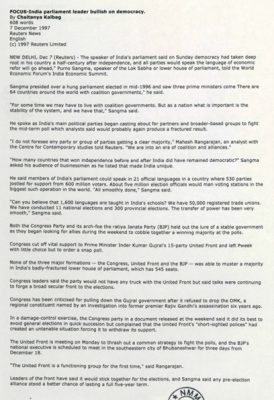FOCUS-India parliament leader bullish on democracy
[Reuters]
Published date: 7th Dec 1997
7 December 1997
Reuters News
English
(c) 1997 Reuters Limited
NEW DELHI, Dec 7 (Reuters) – The speaker of India’s parliament said on Sunday democracy had taken deep root in his country a half-century after independence, and all parties would speak the language of economic refor will go ahead,” Purno Sangma, speaker of the Lok Sabha or lower house of parliament, told the World Economic Forum’s India Economic Summit.
Sangma presided over a hung parliament elected in mid-1996 and saw three prime ministers come There are 64 countries around the world with coalition governments,” he said.
“For some time we may have to live with coalition governments. But as a nation what is important is the stability of the system, and we have that,” Sangma said.
He spoke as India’s main political parties began casting about for partners and broader-based groups to fight the mid-term poll which analysts said would probably again produce a fractured result.
“I do not foresee any party or group of parties getting a clear majority,” Mahesh Rangarajan, an analyst with the Centre for Contemporary studies told Reuters. “We are into an era of coalition and alliances.”
“How many countries that won independence before and after India did have remained democratic?” Sangma asked his audience of businessmen as he listed that made India unique.
He said members of India’s parliament could speak in 21 official languages in a country where 530 parties jostled for support from 600 million voters. About five million election officials would man voting stations in the biggest such operation in the world. “All smoothly done,” Sangma said.
“Can you believe that 1,600 languages are taught in India’s schools? We have 50,000 registered trade unions. We have conducted 11 national elections and 300 provincial elections. The transfer of power has been very smooth,” Sangma said.
Both the Congress Party and its arch-foe the ratiya Janata Party (BJP) held out the lure of a stable government as they began looking for allies during the weekend to cobble together a winning majority at the polls.
Congress cut off vital support to Prime Minister Inder Kumar Gujral’s 15-party United Front and left Pweek with little choice but to order a snap poll.
None of the three major formations — the Congress, United Front and the BJP — was able to muster a majority in India’s badly-fractured lower house of parliament, which has 545 seats.
Congress leaders said the party would not have any truck with the United Front but said talks were continuing to forge a broad secular front to the elections.
Congress has been criticised for pulling down the Gujral government after it refused to drop the DMK, a regional constituent named by an investigation into former premier Rajiv Gandhi’s assassination six years ago.
In a damage-control exercise, the Congress party in a document released at the weekend said it did its best to avoid general elections in quick succesion but complained that the United Front’s “short-sighted polices” had created an untenable situation forcing it to withdraw its support.
The United Front is meeting on Monday to thrash out a common strategy to fight the polls, and the BJP’s national executive is scheduled to meet in the south eastern city of Bhubaneshwar for three days from December 18.
“The United Front is a functioning group for the first time,” said Rangarajan.
Leaders of the front have said it would stick together for the elections, and Sangma said any Pre-election alliance stood a better chance of lasting a full five-year term.
(c) Reuters Limited 1997






